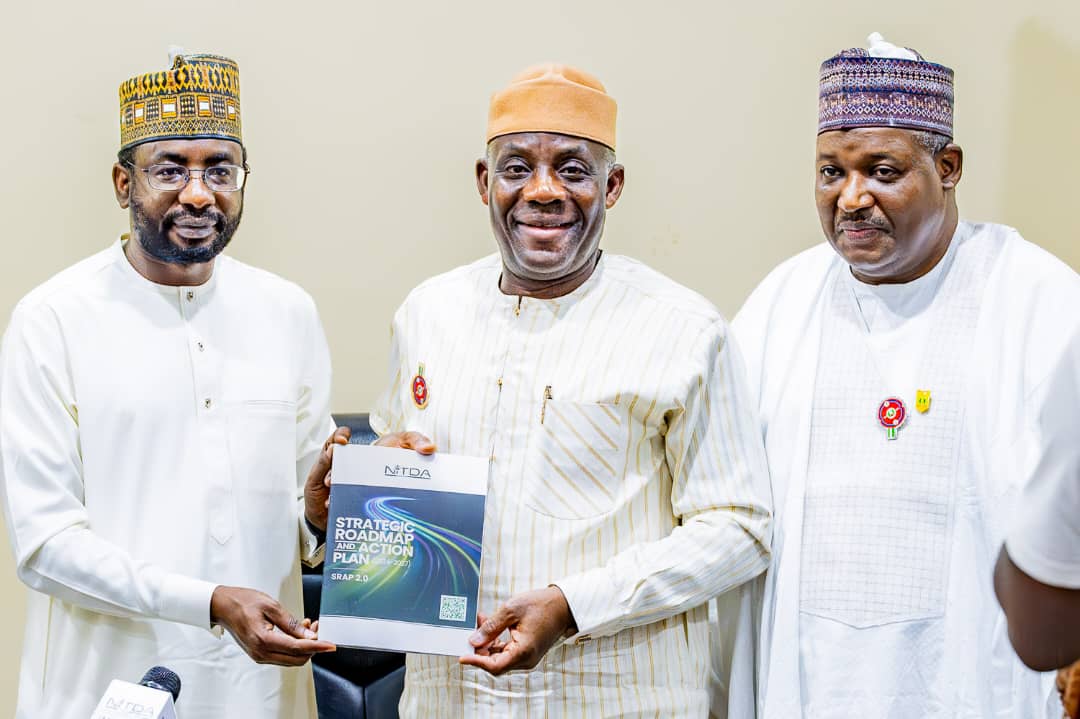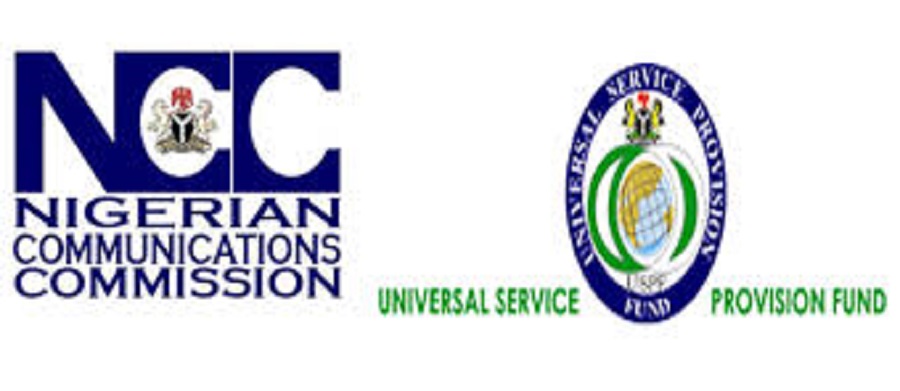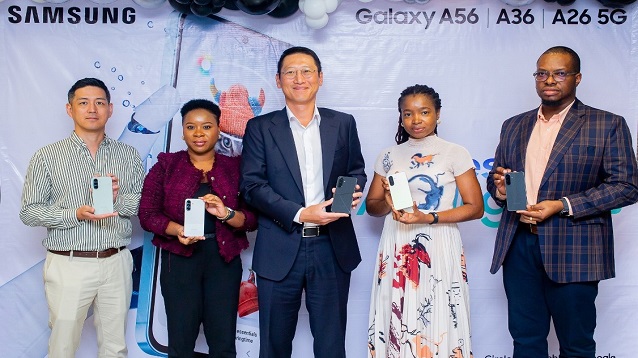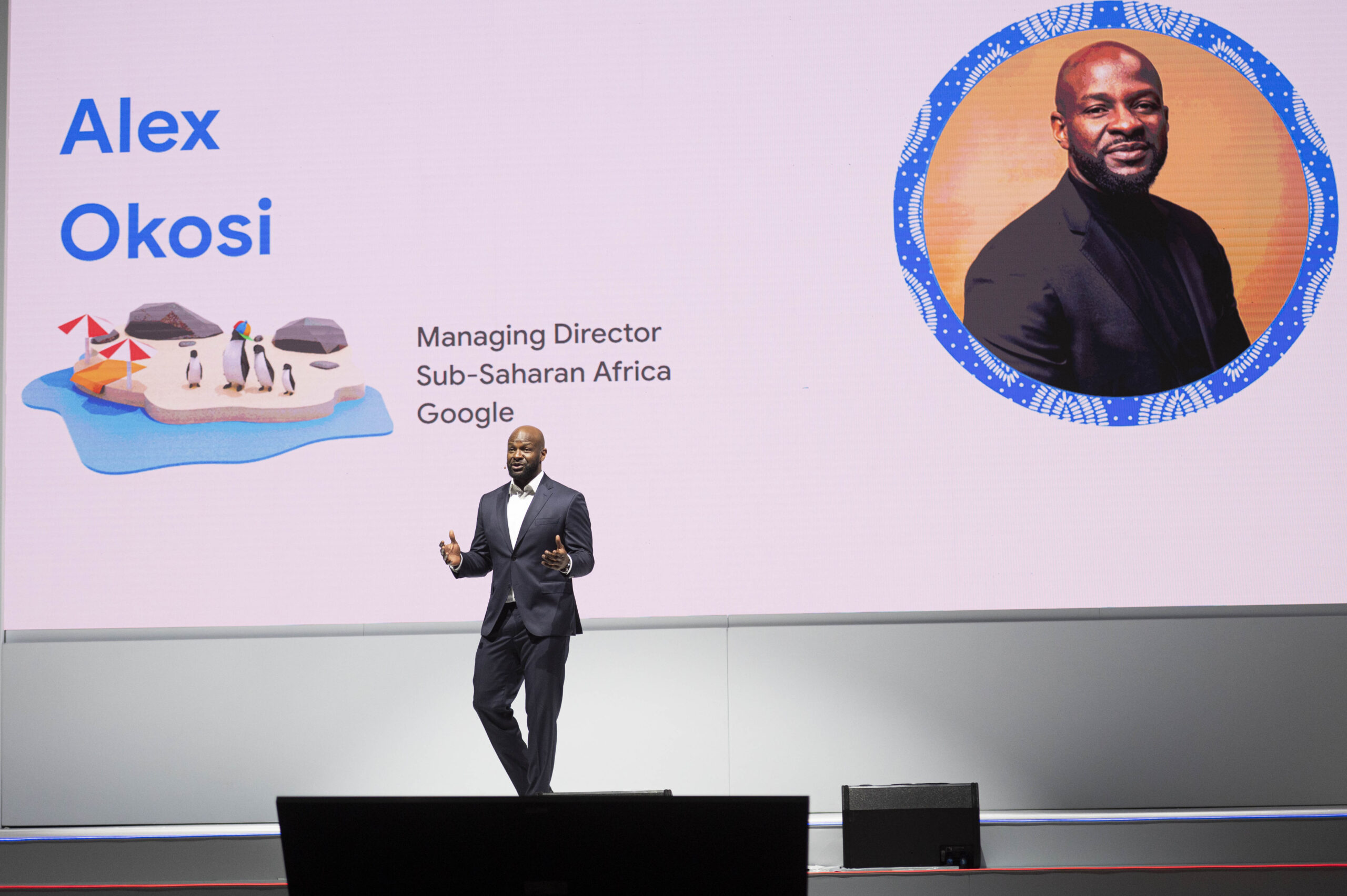Telecom
Digital Literacy Initiative: NITDA and Ministry of Education Join Forces

As part of its mandate to foster digital literacy, cultivate talents and empower Nigerians with the knowledge and skills needed, the National Information Technology Development Agency (NITDA), has initiated a partnership with the Ministry of Education to revolutionise Nigeria’s educational system.

This visionary effort to integrate digital literacy comprehensively into Nigeria’s educational framework came to light during a courtesy visit to the Honorable Minister of Education, Dr. Maruf Tunji Alausa, by DG NITDA, Kashifu Inuwa and his management team on Friday.
The partnership forms a cornerstone of President Bola Ahmed Tinubu’s Renewed Hope Agenda, an ambitious vision to equip young Nigerians with the critical skills required to thrive in the rapidly evolving digital economy.
This initiative seeks to embed digital literacy across all levels of education in Nigeria, starting from the foundational stages in kindergarten through to secondary schools and tertiary institutions, in order to achieve short-term target of 70% and long-term target of 95% digital literacy by the year 2030
During the meeting, Inuwa underscored the urgency of fostering a digitally literate population, highlighting the potential of digital skills to transform lives and economies.
“The future is digital, and the world is evolving faster than ever. If we are to prepare our youth for tomorrow’s challenges, we must begin with today’s education.
“This collaboration with the Ministry of Education is a bold step toward ensuring that no Nigerian child is left behind in this journey toward global competitiveness and innovation,” he remarked.
According to Inuwa, the initiative aims to bridge the digital divide and ensure that every child in Nigeria is adequately prepared to participate in a global economy increasingly defined by digital transformation.
In his response, Dr. Maruf Tunji Alausa praised NITDA’s forward-thinking approach and affirmed the Ministry’s unwavering support for the initiative. “Education remains the foundation upon which national development is built.
“We are ready partner with relevant stakeholders to embed digital literacy into our educational framework, empower our children with the tools and skills they need to not only adapt to change but to drive it,” he said.
With CISCO, National Board for Technical Education (NBTE), National Universities Commission (NUC), National Teachers’ Institute (NTI), National Mathematical Centre (NMC), Universal Basic Education Board (UBEC), and other stakeholders involved, there is already shared commitment to creating an inclusive and technology-driven educational ecosystem.
This ecosystem will empower young Nigerians to not only consume technology but to innovate, lead, and compete on the global stage as the nation progresses into the Fourth Industrial Revolution.
The collaborative effort is set to tackle various dimensions of digital literacy, ranging from curriculum development to teacher training and capacity building.
It will also involve the deployment of state-of-the-art digital tools and infrastructure across educational institutions.
This holistic approach is designed to provide students with hands-on exposure to technology, encouraging critical thinking, creativity, and problem-solving skills from an early age.
Furthermore, the partnership aims to create a ripple effect that goes beyond the classroom, it sets to empower educators with the requisite skills to teach digital literacy effectively and transform the entire teaching and learning process in Nigeria.
It will also focus on addressing regional disparities by ensuring equal access to digital resources in underserved and rural communities, leaving no child or teacher behind.
The involvement of key stakeholders like CISCO, NBTE, NUC, NTI, NMC, and UBEC further strengthens the initiative.
Their combined expertise and resources will provide a robust framework for implementing the partnership’s goals. From introducing cutting-edge technology in schools to fostering a culture of innovation, the collaboration is poised to redefine what education means in Nigeria.
This initiative aligns with Nigeria’s broader goal of positioning itself as a continental leader in digital transformation and innovation. With technology increasingly shaping the global economy, Nigeria’s youth stand at the forefront of this revolution, ready to harness the opportunities presented by a digital-first world.
The partnership further indicates federal government’s commitment to achieving inclusive and sustainable development through digital literacy, and reshaping the very fabric of Nigerian education, ensuring it aligns with the demands of the modern era.
Telecom
USPF to Deploy Transceiver Stations in Rural Nigeria by 2030

Universal Service Provision Fund (USPF) has unveiled plans to deploy 1,000 base transceiver stations (BTS) across rural communities in Nigeria by 2030.

The initiative, in collaboration with development partners, aims to bridge the digital divide and foster socio-economic growth in underserved areas.
Base transceiver stations are essential components of cellular networks, enabling wireless communication between user devices and network infrastructure.
By expanding this infrastructure, the USPF seeks to enhance telecommunications access, supporting vital sectors such as education, healthcare, and commerce.
The move aligns with global efforts to improve rural connectivity, with innovative solutions such as mounting BTS on wind turbines being explored in some regions to ensure cost-effective and widespread network coverage.
With this large-scale deployment, the USPF is reaffirming Nigeria’s commitment to achieving universal ICT access, creating opportunities for millions of people in remote areas to benefit from digital transformation and economic inclusion.
The Universal Service Provision Fund (USPF) is a Nigerian government initiative under the Nigerian Communications Commission (NCC) aimed at bridging the digital divide by expanding telecommunications and ICT services to underserved and unserved areas across the country.
Telecom
Samsung Unleashes AI, Introduces New Galaxy A56 5G, Galaxy A36 5G and Galaxy A26 5G

Samsung has unveiled Galaxy A56 5G, Galaxy A36 5G and Galaxy A26 5G, the latest Galaxy A series smartphones. For the first time, the Galaxy A series is integrating Awesome Intelligence—including Galaxy’s fan-favorite AI-powered features to reimagine creativity — while bringing enhanced durability and longevity, as well as robust security and privacy protections to provide a safe and long-lasting mobile experience.

Awesome Intelligence is the first comprehensive mobile AI exclusively available on Galaxy A56 5G, Galaxy A36 5G and Galaxy A26 5G and brings users powerful, fun and easy-to-use AI tools. Powered by One UI 7, the new Awesome Intelligence features bring amazing search and visual experiences to Galaxy A series users.
“The new Galaxy A series marks an important step in our mission of AI for all, by opening Galaxy’s incredible mobile AI experiences to even more people around the world,” said Tae Sun Lee, CEO Samsung Electronics West Africa. “With these awesome new features and capabilities, we are excited to unlock limitless creativity on the Galaxy A series while ensuring a safe, reliable and fun mobile experience.”
A fan-favorite Google’s enhanced Circle to Search, makes it easier than ever to search and discover from the phone’s screen. Speaking during the unveiling in Lagos, Oge Maduagwu, Head of Marketing, Samsung Electronics West Africa had this to say “With the latest upgrades, users can now get even more done on their phone. Circle to Search will quickly recognize phone numbers, email addresses and URLs on the screen so users can take action with a single tap”.
She added, “With the recent enhancements to Circle to Search, users can also instantly search the songs they hear without switching apps. Whether it’s a song playing on social media from their phone or music that’s playing from speakers near them, just long press the navigation bar to activate Circle to Search, then tap the music button to effortlessly identify the song name and artist”.

The new Galaxy A series also takes the camera experience to a new level with creator-focused tools, starting with a powerful triple-camera system featuring a 50MP main lens on all devices and 10-bit HDR front lens recording on Galaxy A56 5G and Galaxy A36 5G for bright and crisp selfies. Galaxy A56 5G features leading camera technology with a 12MP ultra-wide lens, while the entire Galaxy A series empowers creativity in new and exciting ways through intelligent visual editing.
Exclusively available on Galaxy A56 5G, Best Face makes it easier than ever to capture the perfect group shot by selecting and combining the best expressions or features for up to five people from a motion photo.
Whether someone blinked or looked away, Best Face ensures everyone looks their best in a single, seamless shot. The Galaxy A56 5G also brings enhancements to Nightography, with Low Noise Mode making its way to the 12MP selfie camera and additional wide camera support to capture stunning content in low-light settings.
Stephen Okwara, Head of Product Management, MX Division, Samsung Electronics West Africa, said “Galaxy A56 5G, Galaxy A36 5G and Galaxy A26 5G all bring fine-refined Object Eraser, allowing users to remove unwanted distractions from photos.
“Whether it’s an unexpected passerby or a distracting shadow, users can manually or automatically select objects to erase, achieving a cleaner, more polished final image with just a few taps” He added “With these intelligent tools, users can refine and enhance their photos effortlessly, bringing a new level of creativity to every shot”
With a 5,000mAh battery included throughout the entire lineup, the new Galaxy A series is designed to keep up with users’ daily routines. Galaxy A56 5G and Galaxy A36 5G support 45W charging power and Super Fast Charge 2.0 technology, delivering even faster charging for extended use.
Both models also deliver enhanced performance, as Galaxy A56 5G is powered by the Exynos 1580 chipset and Galaxy A36 5G features the Snapdragon 6 Gen 3 Mobile Platform. A larger vapor chamber in both devices helps sustain performance, ensuring smooth gameplay, video playback, and effortless multitasking.
Now with up to six generations of Android OS and One UI upgrades and six years of security updates, the Galaxy A series reinforces its software longevity even more. These updates add additional support toward optimizing the device’s lifecycle, ensuring users can enjoy a smooth and reliable experience for years to come.
Beyond performance, the new Galaxy A series is built to withstand life’s unpredictable moments. For the first time, Galaxy A26 5G features an IP67 dust and water resistance rating for strong protection against the elements, matching the IP67 rating on Galaxy A36 5G and Galaxy A56 5G. Additionally, an advanced Corning Glass cover material adds a layer of durability against scratches and cracks.
With Samsung Knox Vault, the Galaxy A series provides an extra, fortified layer of device safety, transparency and user choice – ensuring sensitive data always stays protected. Equipped with the latest One UI 7 security and privacy features, Galaxy A series users benefit from holistic protection — including enhancements in Theft Detection, More Security Settings and other features.
Telecom
Google Cloud Launches First African Cloud Region, Driving Digital Transformation

Google Cloud has marked a historic milestone with the launch of its first African cloud region in Johannesburg, South Africa. This initiative is part of Google’s $1 billion investment to accelerate Africa’s digital transformation and foster innovation across the continent.

Operational since January 2024, the Johannesburg cloud region provides African businesses and multinational corporations with access to advanced technologies, including artificial intelligence (AI), machine learning, data analytics, and robust security solutions. These tools empower organizations to enhance efficiency, develop innovative solutions, and unlock new growth opportunities.
The Johannesburg region is a key component of Google’s broader infrastructure investments in Africa. In May 2024, Google announced the Umoja fibre optic cable route connecting Kenya to Australia, complementing the Equiano cable and the Johannesburg cloud region under the Africa Connect initiative. This network aims to improve internet speed, reliability, and affordability, bridging the digital divide and ensuring equitable access to digital resources.
South African President Cyril Ramaphosa hailed the development as a transformative investment, stating, “Google’s growing presence will benefit South Africa and the rest of Africa by enabling firms and entrepreneurs to harness the power of AI, revolutionizing nearly every sector of the economy.”
Thomas Kurian, CEO of Google Cloud, emphasized the company’s commitment to Africa’s digital future, saying, “By bringing cutting-edge cloud and AI technologies closer to local businesses and developers, we aim to accelerate African innovation and drive sustainable growth across the continent.”
The launch event, held at the Gallagher Convention Centre in Johannesburg, featured keynote speeches from industry leaders, including Tara Brady, President of Google Cloud Europe, Middle East, and Africa, and Alex Okosi, Managing Director of Google Sub-Saharan Africa.
Attendees explored Google Cloud’s advanced technologies through business and technical tracks, a partner expo, and customer success stories from organizations like FNB, Moniepoint, and Vodacom.
Google Cloud’s commitment extends beyond infrastructure. Programs such as Cloud OnBoard, Cloud Hero, and Hustle Academy equip learners and businesses with essential skills in AI, machine learning, and digital marketing. Since 2022, Hustle Academy has trained over 15,000 small and medium-sized businesses (SMBs) in Kenya, Nigeria, and South Africa, with the 2025 edition focusing on AI-powered business training.
Additionally, Google Cloud supports Africa’s startup ecosystem through initiatives like the Google for Startups Accelerator Africa.
Over 260 startups across 17 countries have benefited from this program, collectively raising over $600 million in funding and achieving significant growth in employment and revenue.
A 2024 Public First study highlighted Google Cloud’s economic impact, revealing that its tools contributed $16 billion to Sub-Saharan Africa’s economy in 2023.
The study projected that every $1 invested in digital technology in the region would generate over $2 in economic value by 2030.
With its first African cloud region, Google Cloud is not only advancing digital transformation but also empowering businesses and individuals to shape a more connected and innovative future for Africa.

 Telecom3 days ago
Telecom3 days agoFG to Launch $2Bn Fibre Network Project in Q4 2025

 News3 days ago
News3 days agoCourt Orders Oba Otudeko to Respond to Alleged ₦12.3Bn Loan Fraud Charges

 Telecom3 days ago
Telecom3 days agoMTN’s Earnings Hammered by Free Falling Naira in Nigeria

 E-Financial3 days ago
E-Financial3 days agoCentral Bank Defends Naira with $360m in 5-Day

 E-Business3 days ago
E-Business3 days agoFG Partners Cyberpedia to Fight Misinformation with AI

 News3 days ago
News3 days agoTinubu Congratulates Osakwe, Nigerian on Winning UK Top Cyber Security Award

 Telecom2 days ago
Telecom2 days agoATCON Calls for Telecom Policy Improvements in Nigeria

 E-Business2 days ago
E-Business2 days agoGoogle to Buy Cybersecurity Company Wiz for $32Bn


























